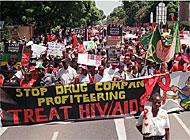WHO backs South Africa in battle against drug firms

The World Health Organisation (WHO) is backing the South African government in a legal battle against 40 big pharmaceutical companies - including three Swiss firms - who are trying to overturn a law allowing the importation of cut-price drugs.
The WHO said on Tuesday that the South African law permitting the import of cheap generic medicine does not violate international rules. The case, being heard at the high court in Pretoria, has been adjourned until April 18.
An alliance of drug companies – including Switzerland’s Novartis, Roche and Janssen-Cilaq – is suing the South African government, arguing that the law infringes their patent rights. They say it is also against the Trade Related Intellectual Property agreement (TRIPS), administered by the World Trade Organisation.
But WHO spokesman, Gregory Hartl, said “there is latitude within the TRIPS agreement for getting drugs to Africans much more cheaply than they are currently getting them”.
He added that the United Nations health agency had provided legal advice to the South African government during the drafting of the 1997 law. It gives the health minister a limited right to import generic versions of patented drugs or to licence their domestic production.
The WHO seldom takes sides in legal disputes, but Hartl said an exception was being made in South Africa’s case because “the WHO supports anything which can be done to get drugs more cheaply”.
The case has stirred up strong emotions in South Africa, which is struggling to cope with an Aids epidemic. According to the UN, South Africa has the highest HIV infection rate in the world, with about 10 per cent of its 45 million people afflicted.
The government maintains that at present it cannot afford the drugs that are desperately needed for fighting Aids and other diseases. It argues that it can best ensure that everyone has access to healthcare by allowing imports of cheap versions of well-known drugs.
But the industry fears that if cut-price drugs become widely available in developing countries they could also filter through to the West.
It points out that South Africa has hitherto refused to distribute Aids medication to its people, even a relatively inexpensive but effective course of anti-retroviral medication.
It also accuses the government of declining pharmaceutical companies’ recent offers of Aids drugs at vastly reduced prices.
For its part, the government says that even at reduced prices the quantity of drugs needed would bankrupt its health budget.
The stalemate has been going on for three years and appears likely to drag on for some time to come.
“We’re dealing with a very enormous challenge and success is not going to be easy,” the health ministry director general, Ayanti Ntsaluba, said.
swissinfo with agencies

In compliance with the JTI standards
More: SWI swissinfo.ch certified by the Journalism Trust Initiative
You can find an overview of ongoing debates with our journalists here. Please join us!
If you want to start a conversation about a topic raised in this article or want to report factual errors, email us at english@swissinfo.ch.